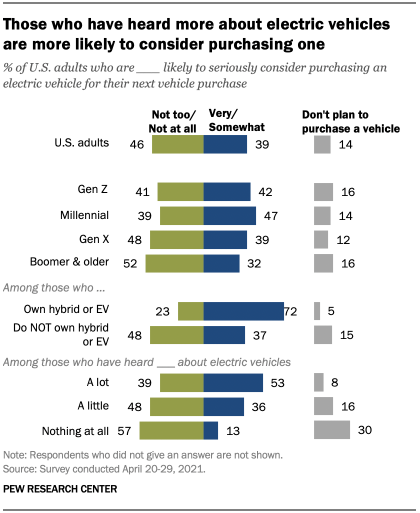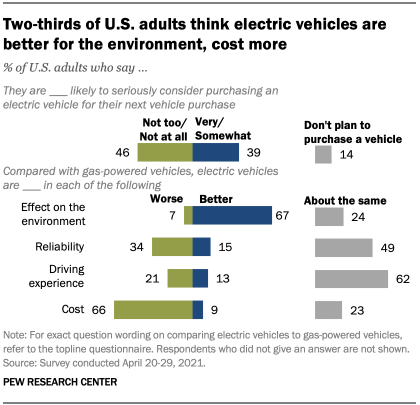Americans are closely divided over the idea of phasing out combustion-engine vehicles by the year 2035, and many are on the fence about whether they themselves would purchase a chief alternative: an electric car or truck.
A recent Pew Research Center report finds 47% of U.S. adults support a proposal to phase out production of gasoline-powered cars and trucks, while 51% oppose it.
Pew Research Center conducted this study to understand how Americans view climate, energy and environmental issues – in this case, their receptivity to embracing non-carbon-emitting electric vehicles. We surveyed 13,749 U.S. adults from April 20 to 29, 2021.
The survey was conducted on the Center’s American Trends Panel (ATP) and included an oversample of adults ages 18 to 24 from the Ipsos Knowledge Panel. A total of 912 Generation Z adults, born after 1996, were included in the sample.
Respondents on both panels are recruited through national, random sampling of residential addresses. This way nearly all U.S. adults have a chance of selection. The survey is weighted to be representative of the U.S. adult population by gender, race, ethnicity, partisan affiliation, education and other categories. Read more about the ATP’s methodology.
Here are the questions used for this report, along with responses, and its methodology.
About four-in-ten Americans (39%) say that the next time they purchase a vehicle, they are at least somewhat likely to seriously consider electric, while 46% say they are not too or at all likely to do so. Another 14% are not expecting to purchase a car or truck in the future.
Just 7% of U.S. adults say they currently own an electric or hybrid vehicle. Most of these owners (72%) say they are very (43%) or somewhat (29%) likely to seriously consider an electric car or truck the next time around.
But the three-in-ten Americans who describe themselves as knowing a lot about electric vehicles are more divided about their openness to going the electric vehicle route: 53% of this group are at least somewhat likely to consider an EV purchase in the future, while 39% say they are not too or at all likely to do so.
Sales of electric vehicles have been slow to take off in the United States, but automakers are investing heavily in the technology, with Ford Motor Co., General Motors and others expecting the global market for EVs to grow.
Millennials, born between 1981 and 1996, are more open to considering the purchase of an electric vehicle, particularly in comparison with Baby Boomer and older adults. Similarly, other findings in the same survey showed that younger generations are more receptive to the idea of phasing out gasoline-powered vehicles. Majorities of Gen Z (56%) and Millennial (57%) adults favor phasing out production of new gas-powered vehicles by 2035, compared with lower shares of Gen X (45%) and Baby Boomer and older (38%) Americans.
The public’s views on electric vehicles at this stage appears clear on two counts. Roughly two-thirds of Americans (67%) say that electric cars and trucks are better for the environment compared with gas-powered vehicles. But a similar share (66%) also sees electric vehicles as hitting a higher price point.
About twice as many Americans consider electric vehicles lacking compared with their gas-powered counterparts when it comes to reliability (34% vs. 15%), but about half of the public (49%) sees little difference between them.
When it comes to the emotionally driven reactions to driving an electric vehicle, a majority call it a toss-up; 62% say the driving experience is about the same between gas- and electric-powered vehicles, while 13% call EVs more fun to drive and 21% give the fun edge to gas-powered vehicles.
Note: Here are the questions used for this report, along with responses, and its methodology.






